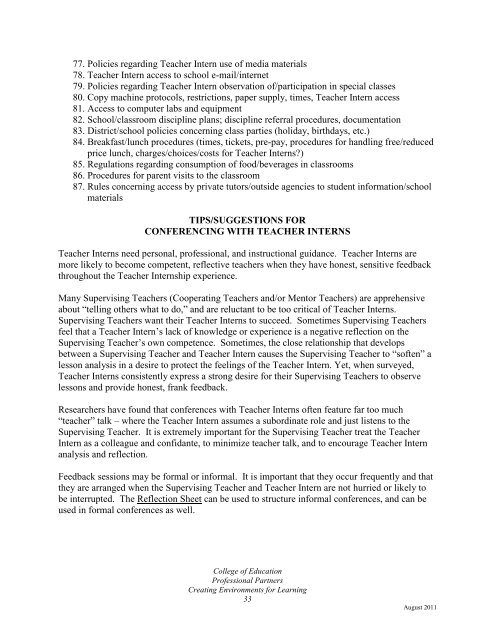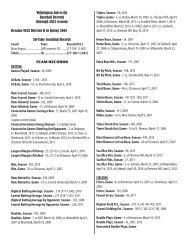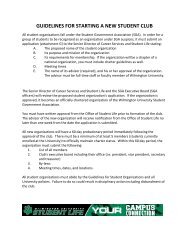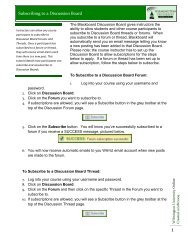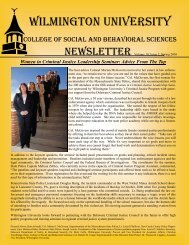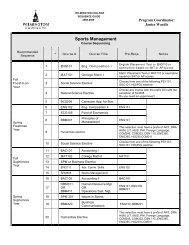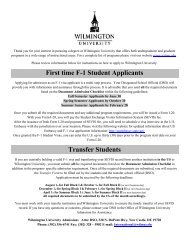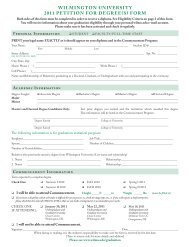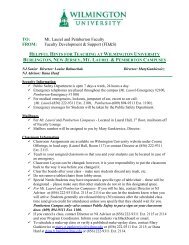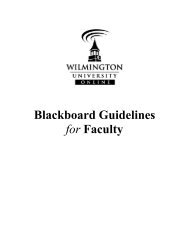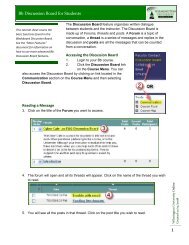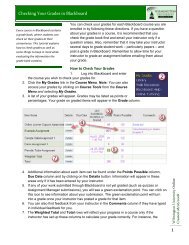37. School/district policies regarding Teacher Interns/substitute <strong>teachers</strong>38. School calendar, holiday schedules; daily, weekly schedules; school hours39. Safety and security procedures40. Intercom use/codes (how/when do you call <strong>for</strong> assistance, in<strong>for</strong>mation, etc.?)41. School policies on photography/videotaping involving students42. Dress codes <strong>for</strong> students and staff43. Parking rules, assigned spaces, etc.44. School opening and closing times (how early, how late?); pupil, staff, Teacher Internsign-in/-out procedures45. Fire, civil defense, emergency procedures (what are your specific responsibilities duringweather emergencies, bomb threats, civil disturbances, utility failures?)46. School evacuation procedures (what are your specific responsibilities – where do you go,what do you do?)47. Playground rules and responsibilities.48. Incident reports (assault, theft, trespass, vandalism, terroristic threatening, etc.)49. Policies regarding pupil searches (personal, clothing, possessions, lockers, etc.)50. School policies regarding student book bags; wearing of coats, hats, etc.51. Procedures <strong>for</strong> handling rumors/knowledge of weapons, drug use, threats52. Procedures <strong>for</strong> reporting cases of suspected child abuse or neglect53. Accident reports (how, to whom, when?)54. School/classroom accommodations <strong>for</strong> students with different abilities55. Reports of unsafe or dangerous physical objects, situations, playground apparatus56. Procedures <strong>for</strong> handling medical emergencies, pupil medications57. School policies regarding pupil possession and use of toys and games58. Rules regarding possession/distribution of controlled substances and look-alikes59. Access to in<strong>for</strong>mation regarding pupil medical problems, allergies, dietary restrictions60. Classroom intake procedures <strong>for</strong> new students; procedures <strong>for</strong> student transfers to/fromother schools61. Procedures <strong>for</strong> handling parent/guardian requests <strong>for</strong> early or unusual dismissals; IDprocedures <strong>for</strong> adults picking up children62. Dismissal procedures <strong>for</strong> walkers, bike riders, private cars, bus riders, etc.63. Policies regarding children arriving early and/or staying after school64. Pupil/Teacher Intern participation in extended day programs65. Rules <strong>for</strong> student movement within the building, nurse/office visits, etc.66. Attendance reporting procedures67. Procedures <strong>for</strong> students left at school, students who missed the bus, late buses68. Restrictions on books and materials (what can students take home?)69. Teacher Intern participation in parent-teacher-student organizations70. Teacher Intern participation in faculty meetings, association/union meetings71. Conference procedures, restrictions, expectations, records72. Teacher Intern role in reporting pupil progress, preparing report cards73. Requests by school staff <strong>for</strong> Teacher Intern assistance (clerical, supervisory, etc.)74. School policies concerning pupil/Teacher Intern use of school telephones75. School restrictions on use of pagers, beepers, cell phones, etc.76. Access to audio-visual equipment, suppliesCollege of EducationProfessional PartnersCreating Environments <strong>for</strong> Learning32August 2011
77. Policies regarding Teacher Intern use of media materials78. Teacher Intern access to school e-mail/internet79. Policies regarding Teacher Intern observation of/participation in special classes80. Copy machine protocols, restrictions, paper supply, times, Teacher Intern access81. Access to computer labs and equipment82. School/classroom discipline plans; discipline referral procedures, documentation83. District/school policies concerning class parties (holiday, birthdays, etc.)84. Breakfast/lunch procedures (times, tickets, pre-pay, procedures <strong>for</strong> handling free/reducedprice lunch, charges/choices/costs <strong>for</strong> Teacher Interns?)85. Regulations regarding consumption of food/beverages in classrooms86. Procedures <strong>for</strong> parent visits to the classroom87. Rules concerning access by private tutors/outside agencies to student in<strong>for</strong>mation/schoolmaterialsTIPS/SUGGESTIONS FORCONFERENCING WITH TEACHER INTERNSTeacher Interns need personal, professional, and instructional guidance. Teacher Interns aremore likely to become competent, reflective <strong>teachers</strong> when they have honest, sensitive feedbackthroughout the Teacher Internship experience.Many Supervising Teachers (Cooperating Teachers and/or Mentor Teachers) are apprehensiveabout “telling others what to do,” and are reluctant to be too critical of Teacher Interns.Supervising Teachers want their Teacher Interns to succeed. Sometimes Supervising Teachersfeel that a Teacher Intern’s lack of knowledge or experience is a negative reflection on theSupervising Teacher’s own competence. Sometimes, the close relationship that developsbetween a Supervising Teacher and Teacher Intern causes the Supervising Teacher to “soften” alesson analysis in a desire to protect the feelings of the Teacher Intern. Yet, when surveyed,Teacher Interns consistently express a strong desire <strong>for</strong> their Supervising Teachers to observelessons and provide honest, frank feedback.Researchers have found that conferences with Teacher Interns often feature far too much“teacher” talk – where the Teacher Intern assumes a subordinate role and just listens to theSupervising Teacher. It is extremely important <strong>for</strong> the Supervising Teacher treat the TeacherIntern as a colleague and confidante, to minimize teacher talk, and to encourage Teacher Internanalysis and reflection.Feedback sessions may be <strong>for</strong>mal or in<strong>for</strong>mal. It is important that they occur frequently and thatthey are arranged when the Supervising Teacher and Teacher Intern are not hurried or likely tobe interrupted. The Reflection Sheet can be used to structure in<strong>for</strong>mal conferences, and can beused in <strong>for</strong>mal conferences as well.College of EducationProfessional PartnersCreating Environments <strong>for</strong> Learning33August 2011
- Page 1 and 2: College of EducationHANDBOOK FORCOO
- Page 3 and 4: TABLE OF CONTENTSCollege of Educati
- Page 5 and 6: We envision our students, as they t
- Page 7 and 8: Master of Education in School Leade
- Page 9 and 10: group and individual interviews hel
- Page 11 and 12: to make judgments, come to informed
- Page 13 and 14: improved practice, (b) increased st
- Page 15: Improved oral and written communica
- Page 18 and 19: PREREQUISITES:The Teacher Internshi
- Page 20 and 21: Learning Outcomes/Learning Activiti
- Page 22 and 23: 9.2 participate in professional dis
- Page 24 and 25: 13.10 appreciates the importance of
- Page 26 and 27: handbooks. Teacher Interns are aske
- Page 28 and 29: TYPICAL (SUGGESTED) SCHEDULE* FOR 4
- Page 30 and 31: 12. Participate in regular progress
- Page 35 and 36: Finally, I want you to summarize th
- Page 37 and 38: You could also try offering some op
- Page 39 and 40: documentation.Recommend early inter
- Page 41: LESSON PLANNING USING THE WIMU TEMP
- Page 44 and 45: In any event, solo teaching should
- Page 46 and 47: Clinical semester credits may, unde
- Page 49 and 50: In many cases, the rubrics let you
- Page 51 and 52: APPENDIX:BS, MEE, and MAT Program P
- Page 53 and 54: SCORINGELEMENTS1.2 Understanding of
- Page 55 and 56: 2.2 Understanding ofhuman developme
- Page 57 and 58: SCORINGELEMENTS3.1 Understanding of
- Page 59 and 60: Teacher Preparation ProgramsScoring
- Page 61 and 62: Teacher Preparation ProgramsScoring
- Page 63 and 64: Teacher Preparation ProgramsScoring
- Page 65 and 66: 6.5Understanding ofhow to maximizet
- Page 67 and 68: Teacher Preparation ProgramsScoring
- Page 69 and 70: Teacher Preparation ProgramsScoring
- Page 71 and 72: 8.3 Thecandidatedemonstratesknowled
- Page 73 and 74: (teacher-designed); (3)publisher-de
- Page 75 and 76: SCORINGELEMENTSUNSATISFACTORY1EMERG
- Page 77 and 78: SCORINGELEMENTS10.2 Understands sch
- Page 79 and 80: strategies, equitablydistributing r
- Page 81 and 82: SCORINGELEMENTS11.2 Understands how
- Page 83 and 84:
SCORINGELEMENTS12.2 Understands leg
- Page 85 and 86:
13.3 Candidateunderstands theimport
- Page 87 and 88:
Teacher Preparation ProgramsScoring
- Page 89 and 90:
College of EducationMASTER OF EDUCA
- Page 91 and 92:
Implement Strategies - Develop and
- Page 93 and 94:
Implement strategies towards assist
- Page 95 and 96:
CEC Standard -SevenInstructionalPla
- Page 97 and 98:
during discussion, (3)rephrasing qu
- Page 99 and 100:
identify achievementgain and diffic
- Page 101 and 102:
3.5 The candidatedemonstratesknowle
- Page 103 and 104:
Wilmington UniversityClinical Repor
- Page 105 and 106:
What data will indicate that the st
- Page 107 and 108:
of the elements in the rubric?Time
- Page 109 and 110:
Wilmington University Teacher Prepa
- Page 111 and 112:
Wilmington UniversityCollege of Edu
- Page 113 and 114:
Competency 2: Human Development and
- Page 115 and 116:
Competency 5: Learning Environment
- Page 117 and 118:
Competency 7: Instructional Strateg
- Page 119 and 120:
Competency 9: Professional Growth -
- Page 121 and 122:
Competency 12: Professional Conduct
- Page 123 and 124:
Competency 14: Employment - Obtain
- Page 125 and 126:
Narrative Comments (Optional)Teache
- Page 127 and 128:
Delaware Standards: This should inc
- Page 129 and 130:
Formative Assessment (ongoing) How
- Page 131 and 132:
Formative Assessment (ongoing) How
- Page 133 and 134:
REFLECTION SHEETTeacher/Teacher Int
- Page 135 and 136:
.COOPERATING TEACHER STIPENDIn orde


